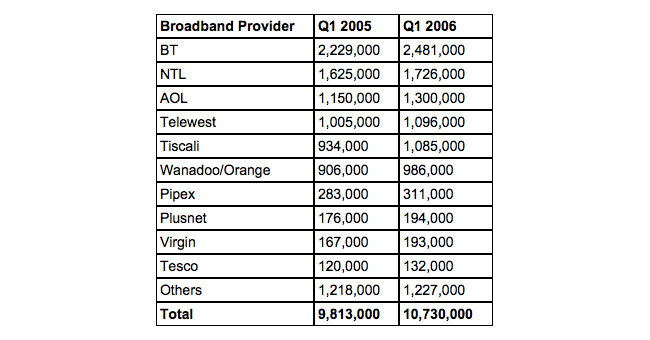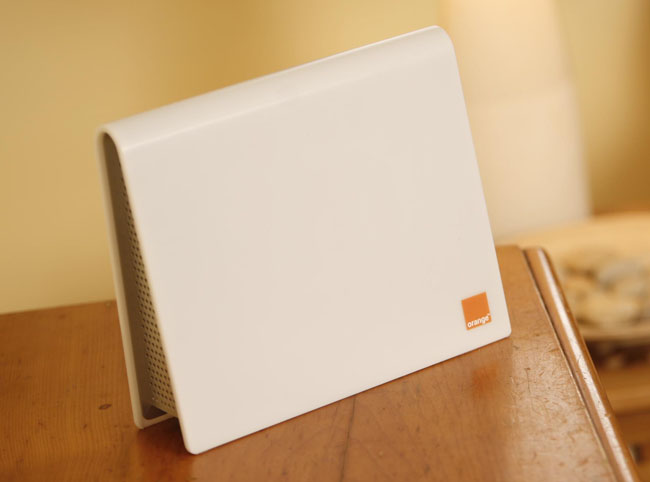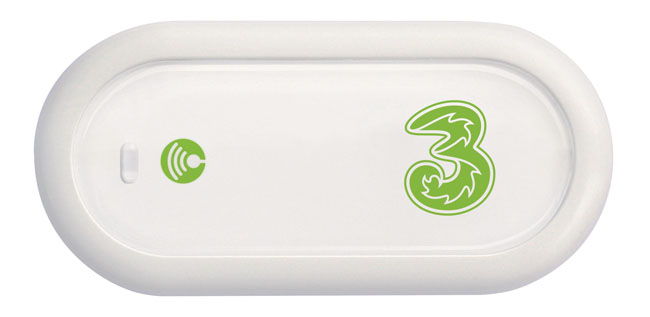This article is more than 1 year old
Future imperfect: A UK broadband retrospective
All that money spent. What is there to show for it?
Free for all
By the end of the following year, it was clear things were being shaken up. Small player E7Even failed, leaving users a choice of being cut off for weeks, or jumping into the arms of another now-defunct company – and they weren't the only ones to fall by the wayside. Satellite broadband outfits Aramiska and Ouranous fell by the wayside too.

The top ten broadband ISPs 2005-2006 by market share is barely recognisable today. Source: Point Topic study
Telewest and NTL finally got their acts together, jumped into bed with Branson's mobile network and became a single network. Carphone Warehouse launched TalkTalk's "free" broadband, followed by Orange, who'd just rebranded its Wanadoo service, and then Sky entered the fray as well.
Of course, just like now, the small print was worth examining; TalkTalk's 40GB of data required a £9.99 call plan, and another £11 line rental, so effectively cost £20.99 a month. Orange's free broadband was contingent on a £30 a month mobile contract, had a miserly 2GB allowance and condition that disallowed emails larger than 10MB. Even back in 2007, that was a bit stingy.

The Orange Livebox provided broadband access, and free calls via a built in VoIP service. A planned IPTV service never made it to the UK
All change
Now that it's built into just about every smart TV, found on phones, tablet and computers, it's hard to remember that the BBC iPlayer has only officially been with us since the end of 2007. It appeared just before Christmas of that year and it's been a more or less an unstoppable juggernaut ever since. Arguably, it has done more to drive the mainstream acceptance of internet video in the UK than anything else.
The same year saw BT roll out its 8Mbps service to most of the exchanges in the UK, alongside the faster ADLS2+ services from LLU operators. The newly branded Virgin Media was offering 10Mbps to all its customers.
While Virgin Media was beginning to take some flak for the introduction of “traffic shaping” in some regions, broadband caps were starting to bite elsewhere as more and more people discovered the joys of YouTube and other bandwidth hogs. With prices falling as a smaller number of ISPs chased a larger and larger number of customers, complaints from punters were rife.
By the end of 2007, mobile broadband was rolling out with HDSPA offering a whopping 1.5Mbps, with the promise of more, but at a price. T-Mobile's Web-n-Walk promised unlimited access for £44 a month, though it actually meant just 10GB.

With 1GB of data for a tenner, and costing just £50, 3's mobile broadband deal kicked up quite a stir
Even so, that was streets ahead of some of the competition, with O2's Data Max 1024 and Orange's Flex Data 35 coming in at over £50 for just 1GB, while Three was offering the same amount of data for just a tenner. Throw in a dongle for £50, and it was a very attractive offer.
There were other new technologies being talked about too. In PCW, we boldly asserted that WiMax would start to be more widely available in 2008. Still waiting for that one.
